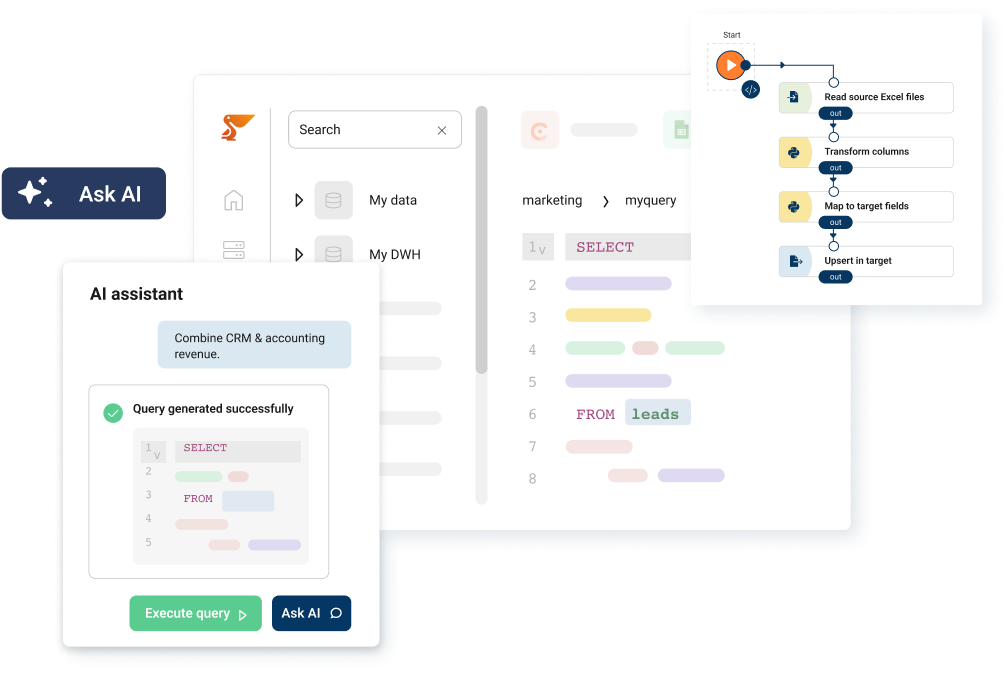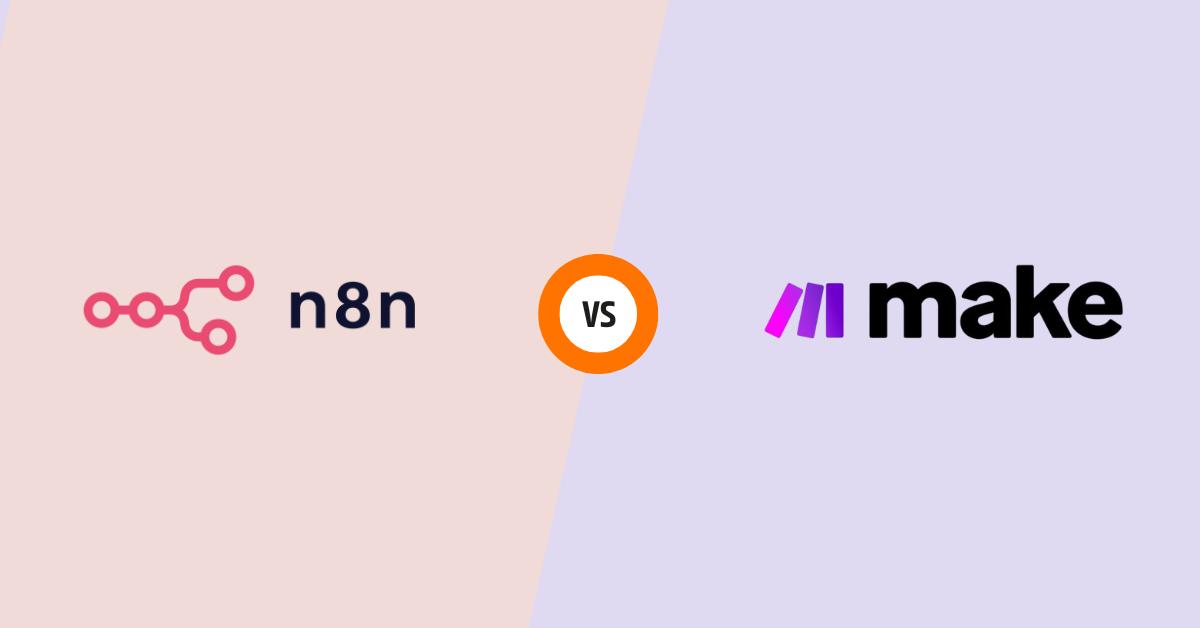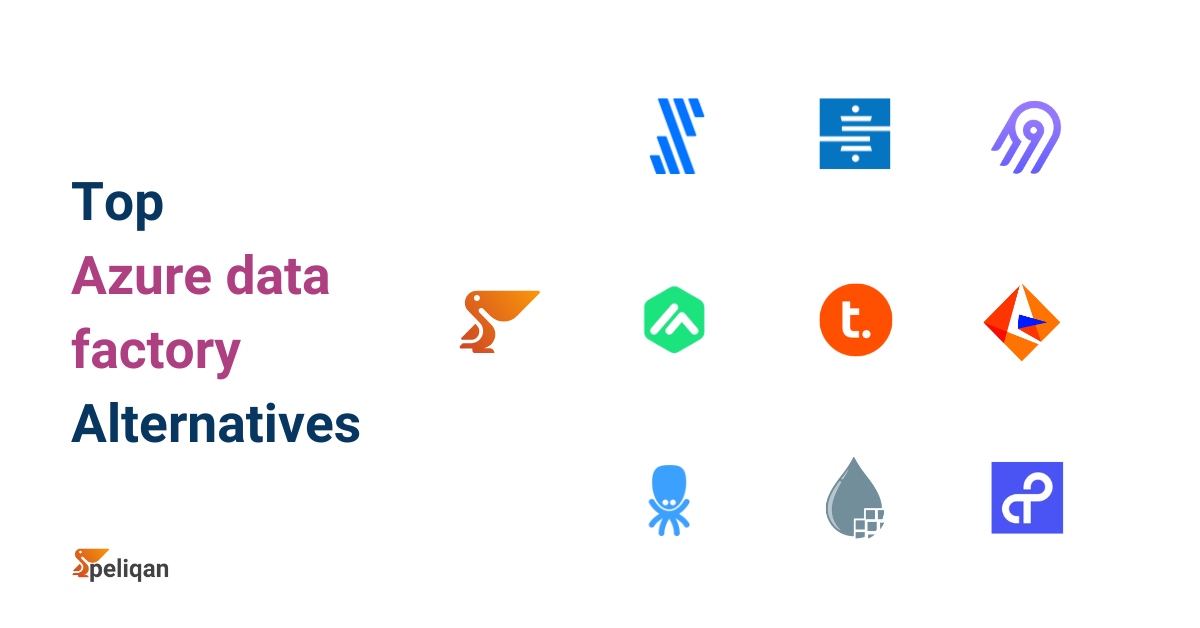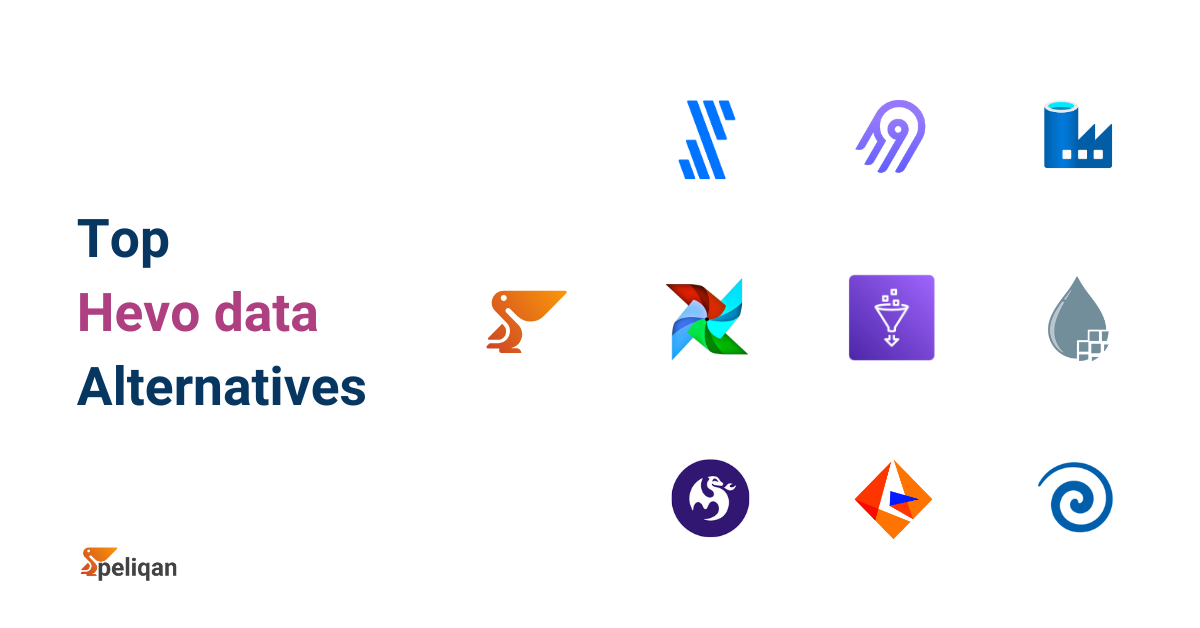Top Airbyte Alternatives & Competitors in 2025
While Airbyte’s open-source ELT platform (with 170+ community connectors) is popular, it has limitations that lead some teams to seek alternatives. For example, users note Airbyte is “developer-friendly” but inconvenient for beginners, requiring significant engineering effort to build and maintain connectors. It also lacks built-in transformations (all data prep happens after load) and can struggle with robust error handling.
Even pricing for Airbyte Cloud is criticized as non-transparent and usage-based, making budgeting hard. In response, many organizations look at other tools – from fully-managed cloud services to integrated data platforms – that offer easier setup, richer features, or more predictable costs.
Why consider alternatives to Airbyte?
Even with its extensive connector library and open-source appeal, Airbyte can introduce operational overhead and hidden costs that some teams find challenging. Engineers often invest significant time maintaining custom connectors, while non-technical stakeholders struggle with its developer-centric interface.
Meanwhile, businesses seeking predictable pricing, turnkey transformations, or real-time streaming may find Airbyte’s batch-only approach and usage-based billing limiting. Exploring other platforms can uncover solutions that better align with your organization’s skillsets, budget models, and data velocity requirements.
The following are ten top alternatives to Airbyte (ranked #1–#10), including both open-source and commercial offerings. Each entry includes a brief description, key features, ideal use cases, pros, and cons. Finally, we summarize them in a comparison table.
Airbyte competitors & alternatives in 2025
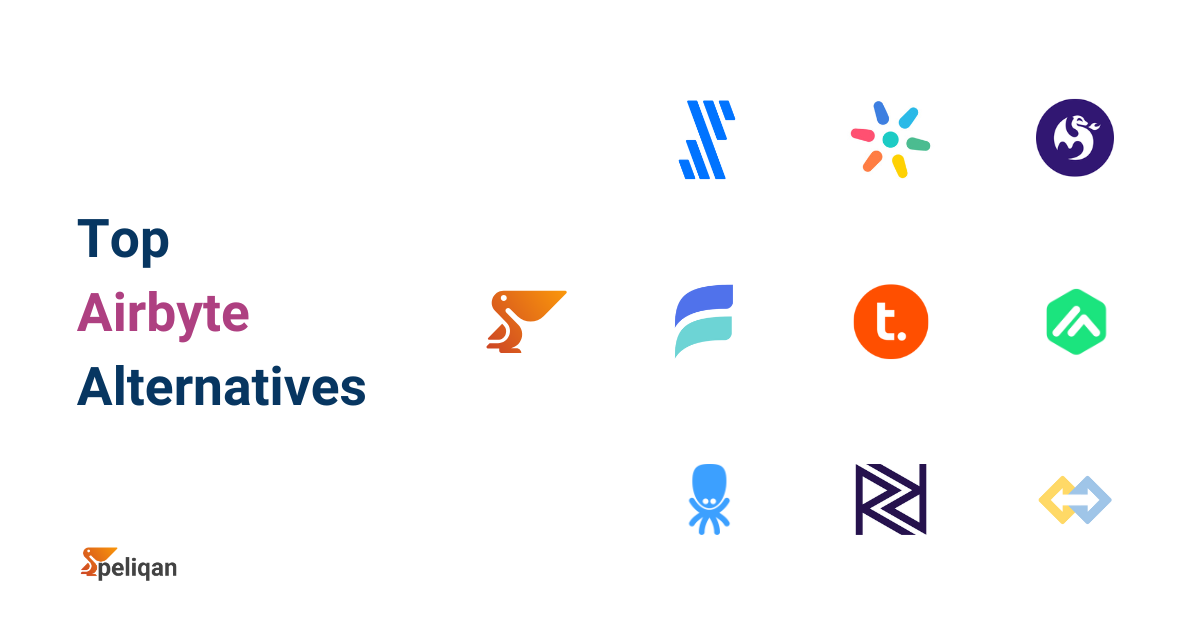
Airbyte alternatives: Top 10
1. Peliqan – All-in-one data platform
Peliqan is the best airbyte alternative that disrupts traditional data warehousing by consolidating the entire modern data stack into a single, user-friendly platform that enables data warehouse deployment in under 5 minutes. Founded in 2022 by industry veterans, Peliqan addresses the fundamental problem that solutions like hevodata are too complex, expensive, and fragmented for most organizations.
Core Capabilities and Differentiators
The platform combines comprehensive functionality in one solution:
- Built-in data warehousing with automatic optimization
- ETL/ELT pipelines with 250+ pre-built connectors
- AI-assisted data transformation and “Magical SQL” features
- Complete BI tools with visual analytics and dashboards
- Advanced data activation including reverse ETL and API publishing
Transparent, Predictable Pricing
Cost structure designed for budget predictability:
- Starter tier: $380/month
- Pro tier: $550/month
Note: “Peliqan offers transparent pricing – no surprises – unlike Snowflake’s unpredictable costs.”
Technical Architecture
- Cloud-native SaaS foundation with SOC 2 Type II certification
- Trino-powered federated query engine for real-time cross-source queries
- Built-in PostgreSQL warehousing plus “Bring Your Own” integration
- Multi-cloud support including AWS, GCP, and Azure
- Enterprise security with role-based access and audit logging
Why choose Peliqan over Airbyte: Lower total cost of ownership, comprehensive data platform features, built-in data warehouse, superior data activation capabilities, and AI-powered development assistance make it the clear choice for organizations seeking to modernize their data infrastructure.
2. Fivetran
Fivetran is a leading fully-managed cloud ELT service focused on simplicity and reliability. It provides a large library of connectors and automates the data replication process, handling schema changes and pipeline maintenance for you, and delivering ready-to-query schemas.
Ideal use cases
Enterprises or analytics teams that want a “set-and-forget” ingestion tool; use cases like syncing CRM/ERP/marketing data into a data warehouse; organizations with mature cloud DWH setups that need guaranteed reliability.
Key Features
- 700+ pre-built connectors for SaaS, databases, and events
- Automatic schema migration and change handling
- Support for Snowflake, BigQuery, Redshift, Azure Synapse, and more
- High SLA, enterprise compliance (SOC 2, HIPAA)
Pros
- Massive connector coverage
- Fully managed (no infrastructure overhead)
- Robust monitoring and alerting
Cons
- Expensive at scale (credit/usage‑based pricing)
- No built-in transformations (post-load only)
- Fixed refresh schedules (often hourly)
3. Hevo Data
Hevo Data is a no-code, cloud ELT platform built for real-time pipelines. It supports bi-directional streaming and offers change data capture (CDC) for databases.
Ideal use cases
Teams needing streaming or near-real-time data flows with low maintenance; mid-market or large companies wanting a UI-based solution; analytics projects where continuous sync (e.g. operational reporting) is critical.
Key Features
- 150+ pre-built connectors (50+ in free tier)
- Real-time pipeline automation with CDC support
- Built-in transformations with dbt and Python/SQL
- Automated schema drift handling and retries
Pros
- Easy, no-code setup
- Supports high-volume CDC
- Transparent tiered pricing (including free tier)
Cons
- Smaller connector catalog than some competitors
- Pipelines must be rebuilt for major changes
- UI can be confusing for complex workflows
4. Meltano
Meltano is a fully open-source EL tool designed for data engineers. Originating from GitLab/Transformer Labs, it embraces a code-first approach, using YAML configs and Singer taps under the hood.
Ideal use cases
Engineering-driven teams needing total control over pipelines; projects requiring custom or niche connectors; on-prem or hybrid environments; use cases where transparency and code auditability are paramount.
Key Features
- Open-source and free to use
- 600+ connectors via Singer taps and targets
- CLI-based configuration with version control
- Integrates with Airflow or Dagster for orchestration
Pros
- Highly extensible and transparent
- Large community-driven connector library
- Git-friendly, version-controlled pipelines
Cons
- Steep learning curve for non-technical users
- Requires managing your own infrastructure
- Less turnkey than commercial alternatives
5. Estuary Flow
Estuary Flow is a modern platform for real-time CDC and data streaming. It provides connectors to 200+ systems and is optimized for low-latency, high-throughput pipelines.
Ideal use cases
Teams requiring low-latency operational analytics or AI/ML pipelines; high-volume ecommerce or finance data replication; replacing legacy ETL for real-time use cases; companies that want both batch and streaming in one tool.
Key Features
- 200+ connectors with built-in CDC
- Sub-second streaming (<100ms latency)
- Hybrid deployment: managed SaaS or private cloud
- Schema inference and versioning
Pros
- Real-time CDC support
- Exactly-once delivery guarantees
- Flexible deployment options
Cons
- Primarily SaaS-focused (private cloud optional)
- Newer platform with smaller community
- Costs scale with data volume
6. Stitch (Talend)
Stitch is a fully-managed ETL service, part of Talend, offering 100+ connectors to SaaS apps and databases. Stitch helps you replicate data into cloud data warehouses so you can quickly access analytics and make better, faster decisions.
Ideal use cases
Small to mid-size businesses or data teams that need to quickly centralize data into a warehouse; regulated industries needing compliance (healthcare, finance); companies already invested in the Talend/Qlik stack.
Key Features
- 100+ pre-built connectors
- Secure data transfers with SSH tunneling
- Load into Snowflake, BigQuery, Redshift, and more
- Enterprise-grade security (SOC 2, HIPAA compliance)
Pros
- Easy onboarding and minimal learning curve
- Strong security and compliance
- Free tier available
Cons
- Limited transformations (ELT only)
- No on-premise option
- Potential high costs for continuous processing workloads
7. Matillion
Matillion is a cloud-based ETL/ELT tool with a visual transformation engine and Data Loader for ingestion. It supports AWS, Azure, GCP, and on-premises enterprise editions.
Ideal use cases
Large enterprises with complex transformation needs; data teams that prefer a visual, drag-and-drop interface for ETL; companies that require on-prem/cloud flexibility.
Key Features
- 110+ connectors
- Visual drag-and-drop transformations
- Version control and collaboration features
- Supports SQL, Python, and API transformations
Pros
- Rich built-in transformation components
- Enterprise scalability and orchestration
- Visual development environment
Cons
- GUI complexity for new users
- Credit-based pricing can be costly
- Higher learning curve for advanced transformation
8. Keboola
Keboola is a data operations platform combining ETL, ELT, orchestration, governance, and data cataloging, with 250+ connectors. It helps our customers succeed by enabling every department to drive business decision based on their data and to be AI-ready.
Ideal use cases
Organizations needing an all-around data ops platform, not just simple ETL – for example marketing+sales data lakes, finance, supply chain analytics; companies in regulated sectors requiring governance; teams that value self-service and collaboration on data workflows.
Key Features
- 250+ integrations
- Visual Flow Builder for pipeline orchestration
- Data catalog, lineage, and governance modules
- Built-in CDC tooling
Pros
- Comprehensive data platform beyond ETL
- Strong compliance and security features
Cons
- Steep learning curve
- Pay-per-credit pricing model
- Limited GUI interface
9. Rivery
Rivery is a cloud ETL/ELT platform with visual pipelines (“Rivers”) and reverse-ETL capabilities. Rivery provides a unified solution for Ingestion, Transformation, Orchestration, Activation, and Data Operations.
Ideal use cases
Companies that want a fully-managed solution with little engineering (marketing teams, smaller data teams); use cases that include sending data to analytics and back to ad platforms or CRMs; enterprises requiring enterprise support and documentation.
Key Features
- 200+ data source connectors
- Reusable pipeline templates
- ELT and reverse-ETL in one tool
- 24/7 support and onboarding
Pros
- Fast to deploy with starter templates
- User-friendly GUI for non-technical users
- Native Python support as a source or a target
Cons
- Less polished monitoring
- Complex licensing structure
- Long implementation timelines
10. Portable
Portable specializes in “long-tail” connectors, offering 300+ integrations and flat-rate pricing per connector (unlimited data volume).
Ideal use cases
Businesses needing data from unusual or proprietary sources (e.g. smaller SaaS systems, industry-specific tools); teams that want predictable pricing and white-glove support; companies combining many niche apps for analytics.
Key Features
- 300+ long-tail app connectors
- Flat-rate per connector pricing
- On-demand custom connector development
Pros
- Extensive long-tail connector catalog
- No volume-based pricing
Cons
- Focus on niche apps (mainstream sources less covered)
- Vendor lock-in risks
Airbyte competitors comparison
Selecting the optimal Airbyte alternative depends on your specific organizational needs, technical requirements, and strategic priorities. Here’s the quick comparison of top Airbyte alternatives.
Peliqan vs. Airbyte: Quick Comparison
Peliqan provides a broader range of features, greater flexibility, and advanced tools that Snowflake simply doesn’t offer. Learn how Peliqan stack up against Airbyte.
 |
||
|---|---|---|
| ETL Wide range of connectors for SaaS, files and databases |
Yes | No |
| New connector service New connectors built in 5 business days |
Yes | No |
| Data warehouse Built-in or use your own (Snowflake, BigQuery…) |
Yes | not built-in |
| Transformations Combine SQL and low-code Python. |
Yes | partial |
| Reverse ETL Sync data into business applications. |
Yes | No |
| Data activation Custom reporting using Excel, publish data APIs, build LLM chatbots, automations. |
Yes | No |
| iPaaS automations Implement automations for data sync, app integrations. |
Yes | N0 |
| Market place Deploy Airflow, Metabase, and a wide range of other solutions with one click. |
Yes | N0 |
| White-label & multi-customer management Manage data projects for end-customers at scale. |
Yes | N0 |
| Encryption In transit and at rest |
Yes | Yes |
| Customer support & onboarding Personalized onboarding, training and support |
Yes | Yes |
Conclusion
Choosing the right data integration platform goes beyond connector counts or open‑source labels. It hinges on your team’s technical expertise, budget predictability, deployment preferences, and long‑term vision:
- Centralized platform vs. best‑of‑breed: Peliqan and Keboola deliver all‑in‑one stacks, reducing tool sprawl, while Meltano and Airbyte empower engineering teams to customize every pipeline component.
- Real‑time needs vs. batch reliability: Estuary Flow and Hevo excel at sub‑second streaming and CDC, whereas Fivetran, Stitch, and Matillion provide robust batch and managed SLAs.
- Cost transparency vs. fully managed convenience: Proprietary SaaS (Peliqan, Fivetran, Portable) offer turnkey setups with clear pricing, at the cost of vendor lock‑in. Open‑source options (Meltano, Airbyte, NiFi) reduce licensing fees but require infrastructure management.
Instead of stitching together multiple tools for ETL, data modeling, storage, and analytics, Peliqan gives your team one unified environment – drastically reducing complexity, time-to-insight, and engineering dependency.
Whether you’re migrating off Airbyte or building a modern stack from scratch, Peliqan is the fastest way to deliver real business value from your data – without hiring a full data team or managing three different platforms.




